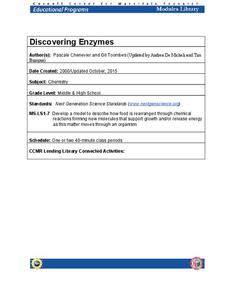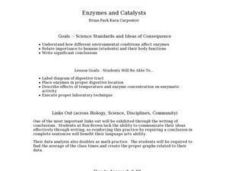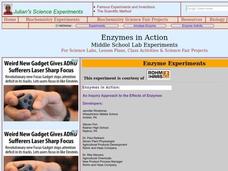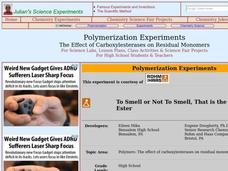Curated OER
Catalysts and Enzymes
Biochemists experiment with the oxothermic decomposition of hydrogen dioxide by adding manganese dioxide. They observe how pepsin enhances the action of acid on the digestion of egg white proteins. They use yeast to make bread rise. All...
Cornell University
Discovering Enzymes
Explore the function of enzymes through a series of lab investigations. Learners use household enzymes such as hydrogen peroxide to model the role of enzymes. The enzymes break down proteins with and without a catalyst.
Curated OER
Enzymes and Catalysts
Students discuss the functioning of the digestive system and the specific enzymes present. They observe the action of amylase on starch to identify characteristics of enzymes then perform an experiment on the effects of temperature on...
Curated OER
Enzyme Lab
Students investigate the enzyme catalase. In this enzyme lesson plan, students observe a normal catalase reaction, they observe liver tissue, potato, chicken and apple for the enzyme catalase and they study the effects of temperature and...
Curated OER
Enzymes in Action
Students explore how enzymes are important in the chemical reactions of all living things. In this enzymes and catalysts lesson students complete an activity to see how enzymes change living things.
Curated OER
Enzymes
Students explore enzymes and what can inhibit and act as a catalyst for them. In this enzymes lesson students complete experiments on enzyme properties.
Curated OER
Enzyme Activity: An Inquiry Based Approach
Young scholars explore biochemical reactions mediated by enzymes in an inquiry approach. They are given two questions about the types of living materials that contain the enzymes that break down hydrogen peroxide, and under what...
Curated OER
Enzyme Activity: An Inquiry Based Approach
Using an inquiry approach to studying biochemical reactions, cooperative teams of students investigate hypotheses about living materials that contain enzymes which break down in hydrogen peroxide. They perform experiments, practice...
Curated OER
Enzymes
Tenth graders test their saliva for enzyme activity. In this enzyme activity, 10th graders conduct an experiment to test the enzymatic activity of their saliva. They relate the lack of certain digestive enzymes with alcoholism.
Curated OER
Temperature and Enzymes
Students compare the times it takes the milk in each of two cups to curdle. They are told that an enzyme that is added to the milk, rennin, is involved in the natural curdling process of milk. Students are asked to consider what...
Curated OER
Catalase and Catalysis
Students explore enzyme catalysis through a series of experiments. In this chemistry activity, students determine the factors affecting catalysis. They explain the different uses of this process.
Curated OER
Enzymatic Action
Students observe how a cell uses an enzyme to rid itself of a poisonous substance by experimenting with hydrogen peroxide, potatoes, liver and carrots. They record the temperature and changes of the hydrogen peroxide as other elements...
Curated OER
Polymerization Experiments
High schoolers explain the process of polymerization. For this chemistry lesson, students produce carboxylesterase in the lab. They test its effectiveness in removing the by-product odor.
Curated OER
Enzymatic Browning Experiment
Students, in groups, experiment with Heat Blanching, Vitamin C Dip, and Sulfur Dioxide Dip to see if they can prevent enzymatic browning.
Curated OER
To Smell or Not to Smell, That is the Ester
Students explain the basic concepts of polymerization. Students participate in a lab to create a crude preparation of carboxyl esterase and test its effectiveness in reducing the residual monomer in an emulsion such as paint.
Curated OER
What's on Your Plate?
Young scholars demonstrate the path of food in the body. In this biology lesson, students conduct an experiment to determine how large the the digestive system is. They name the different organs involved in the digestive process.
Curated OER
Insect Classification
Students compare and contrast the visible structures of three insects based on photographs. They differentiate characteristics of crane flies, ants, and wasps then create a simple classification system.
















